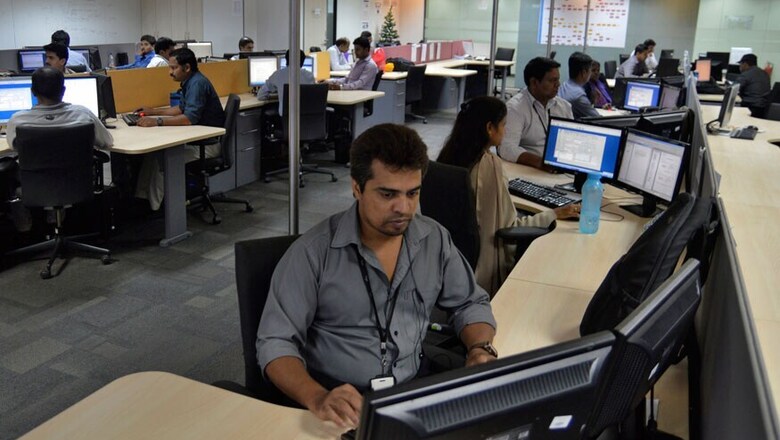
views
Farhan (name changed) has just graduated from Hyderabad’s Muffakham Jah College of Engineering and Technology with a degree in Electronics and Communication Engineering, but is anxious about his future. He was offered a job, but it is not the one he wanted, after studying computer science, digital systems and basic electronics.
The 21-year old attended two campus placement tests: Amazon and Capgemini. The Amazon placement test didn’t have a technical round. The first round was called ‘jam session’, where participants could talk about anything. Farhan spoke about his favourite footballer Cristiano Ronaldo; the second round tested how well the participants receive data and the final round was a writing test.
Capgemini, on the other hand, had an aptitude round that tested his maths and analytical skills. Farhan got through, but fell at the next round. They asked him to write a program, which he couldn’t. He didn’t even qualify for Infosys because his CGPA was less than the requisite 75% cutoff.
Amazon offered him a position in Hyderabad in their seller support vertical. “It was basically a dead end job. It may be attractive because there is a lot of youth and buzz, but I would have stagnated there,” said Farhan. “Did I put in 4 years of hard work only to land up in a call centre?” Farhan was offered a starting salary of Rs 21,000 per month, but he turned down the offer. He would have much preferred Capgemini. He now plans to do an MS abroad.
Farhan’s experience highlights the crisis in India’s engineering education. The nature of the IT industry is changing and the technical education framework that prepares students has been caught unawares. Old curricula, unqualified teachers and engineering colleges that churn out ‘functionally illiterate’ graduates are just some of the issues that are contributing to the gap in technical education.
A report by Aspiring Minds, a skills assessment and credentialing company, says that only 36% of engineers are able to write compliable code. It also states that nearly 85% of graduates are not “employable” for IT services jobs. The report concludes that “industries shall have a very hard time in hiring students for their organization who are able to fit in the criteria and yield required results.”
Kris Lakshmikanth, founder Chairman of Head Hunters India, estimates that between 1,00,000 to 2,00,000 jobs will disappear each year from the IT industry for the next 3 years. Beyond that time frame it is difficult to predict what will happen. He wrote in a column for News18.com that, “for the first time, across sectors — IT/BPO/Telecom/Retail/BFSI/ Autos — companies are laying off people in large numbers.”
The Indian IT industry is undergoing a tremendous churn as new digital technologies disrupt the old business model. Techies have to acquire new skill sets or go the way of the dodo. Engineering colleges, on their part, are unable to keep pace with the rapid changes and are churning out graduates ill prepared to handle the digital transformation.
Varun Aggarwal, the Chief Technology Officer of Aspiring Minds, describes he established business model of Indian IT as “body shopping”. It was based on price arbitrage: what an American techie could do, an Indian techie could do for a fourth of the cost. The result was American companies offshoring maintenance to Indian firms. Kris Lakshmikanth estimates that 50% of the revenues of Indian IT firms came from application maintenance. However, new technologies like automation, machine learning, artificial intelligence and data science is making this irrelevant.
The IT industry of the near future will be about algorithms, data structures/mining etc. where innovation, rather than body shopping, will be the rule. Algorithms are already used extensively. Amazon uses algorithms to recommend books and Netflix to suggest movie picks.
Consider the R&D of Indian academia and companies. In the field of machine learning, a subset of artificial intelligence, China’s Tsinghua University alone produces more papers per year than all Indian universities combined.
India’s total contribution in the form of original research papers is 745 compared to China’s 3,956 and the USA’s 19,000+, according to Varun Aggarwal.
Then there is the quality of teachers, which is low. To get a sense, News18 spoke to Dr. Anupam Shukla, a professor at Indian Institute of Information Technology, Gwalior. IIIT only recruits faculty who have PhDs in their relevant fields, but many private universities skip this criterion and recruit substandard faculty. “There is a skills gap in private institutions, competent faculty are not being hired there,” Dr. Shukla said.
The IIITs, along with IITs and some of the National Institutes of Technology (the erstwhile RECs) and a few private colleges like BITS are among the best in India. They produce competent graduates, but even their quality of research and innovation is not up to international standards.
After the top 100, the quality of education and faculty drops off rapidly. There are 3,288 engineering colleges accredited by the All India Council for Technical Education, more than double the 1,511 colleges 10 years ago. Of these only 23 are IITs, 31 are NITs and 20 are IIITs. There has been an increase in quantity, but the quality has suffered in the process. 15 lakh engineers graduate every year, but only 5 lakh are absorbed. Campus placements are at an all-time low: 40% in AICTE colleges and 66% in IITs.
The problem of ill-trained engineers existed in the past too, but companies like Infosys and Wipro set up their own in-house facilities to train graduates before they put them to work. However, in the fast-paced business environment of today, where margins are shrinking and the pressure to cut costs is immense, companies can no longer afford this. Engineering colleges will have to pick up the slack and ensure that graduates are market-ready.
This will mean updating curricula, recruiting qualified professionals and ensuring that students are taught to innovate rather than rote learning.



















Comments
0 comment